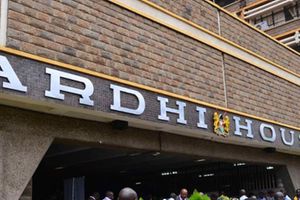
A fraudulent judgment, falsely attributed to a dead judge, was used to dispossess the original owner of the land before it was sold to the company.
A real estate firm has lost property worth more than Sh28 million after the Environment and Land Court in Malindi uncovered that a fraudulent judgment, falsely attributed to a dead judge, was used to dispossess the original owner of the land before it was sold to the company.
Justice Evans Makori declared that the transfer of the parcel of land known as Kilifi/Roka/308, registered on November 29, 2021 in favour of Inuka Africa Properties Ltd, is null and void.
“A declaration is hereby issued that the title held by the firm in respect of the said property is cancelled and the same is restored to its status before the registration of the transfer on November 12, 2020 in favour of Juma Pamba and Omar Pamba,” Justice Makori ruled in a decision dated April 2.
The judge also issued a 90-day eviction order against the firm, requiring it to vacate the property immediately and surrender vacant possession to Lawrence Charo Karissa, the rightful owner.
In addition, Sh5 million in general damages was awarded to Mr Karissa against Juma and Omar.
The judge also awarded Karissa costs for both the main suit and the counterclaim, including interest at court rates.
Justice Makori expressed concern over the case, describing it as a troubling example of how court registry personnel can be complicit in destroying documents, fabricating judgments, and submitting misleading returns to obstruct justice.
The fraudulent judgment, dated February 11, 2014, was falsely attributed to the late Justice Samuel Mukunya, who tragically died in a road accident on September 18, 2018.
“The esteemed judge did not issue the judgment in question; it was the work of a cabal of fraudsters, not an ELC judge. Any endorsements, approvals, consequential orders and repercussions stemming from this deceitful judgment have been declared null and void by two judges,” said Justice Makori.
The dispute dates back to 2002 when Karissa was informed of a parcel of land on sale belonging to Hamisi Mbwana.
“Satisfied with both the legal and physical status of the plot, I purchased it. After meeting all legal requirements, it was transferred to me on June 11, 2002. Thereafter, I took possession and began its development,” Karissa said.
Later that year, in September 2002, Karissa was informed by Chalalu Kofa, the advocate who had represented Mbwana during the sale, that one Juma Pamba Ismael had filed a lawsuit against Mbwana over the same plot so he needed to join to protect his interest.
However, no further communication followed, and Karissa assumed the matter had been resolved or abandoned.
It was not until December 2004, over two years later, that Karissa received a summons to appear before the Bahari Land Dispute Tribunal.
The Tribunal adjourned the matter, pending the hearing and determination of ELC No. 39 of 1996, which Ismael had filed against Mbwana.
Karissa was formally joined in the case as a defendant on October 9, 2008.
After Ismael’s death, his widow Mishi Pamba was substituted as the plaintiff. Notably, Juma and Omar were never joined as parties in ELC 39 of 1996.
On October 10, 2011, Mishi testified as the first witness before Justice Muriithi. The second witness testified on January 25, 2012.
The case was later mentioned on July 3, 2012 and again on December 6, 2012, when it was scheduled for hearing on February 7, 2013.
On that date, the case was listed before Justice Maureen Odero, who referred it to Justice Muriithi for directions.
Justice Muriithi, who was due for transfer, then set the hearing for March 20, 2013 before the judge in charge of the Land Division. After this, the case went silent, and no further hearing was scheduled.
A year later, Karissa was unexpectedly served with an application before the Principal Magistrate in Kilifi, seeking his eviction from the land based on a judgment allegedly delivered by Justice Mukunya in February 11, 2014.
Karissa opposed the application, arguing the judgment was fake, but the magistrate dismissed his objection, paving the way for his eviction.
Using the fraudulent judgment, Juma and Omar had the property transferred into their names and later sold it to Inuka Africa Properties Ltd for Sh10.2 million in 2020.
Feeling defrauded, Karissa filed a fresh application at the Environment and Land Court, claiming that the judgment used to dispossess him was fake and never issued by the court.
Inuka Africa Properties Ltd, as the new owner, defended its title, arguing that it was an innocent purchaser for value. The company claimed it conducted due diligence at the Land Registry, which indicated the land belonged to Juma and Omar, who held titles issued on November 12, 2020.
“Upon signing the sale agreement, all necessary steps were taken, and relevant consents obtained, resulting in a transfer dated November 5, 2021,” said the firm’s director, Joseph Muchere
The firm sought to be declared the rightful owner of the property, insisting it had no knowledge of the fraudulent transaction and had not colluded with Juma and Omar to deprive Karissa of his land.
However, Justice Makori ruled that the firm’s claim of being an innocent purchaser could not stand, given the judgment upon which the transfer was based had been declared non-existent and fraudulent.
“It is undisputed that the firm’s title originates from the titles of Juma and Omar, which were acquired fraudulently. Based on these facts, the doctrine of a purchaser for value without notice is not available to the firm as a defence,” the judge stated.
He added that for a purchaser to benefit from this defence, they must investigate the history and root of the land title, not simply assume the validity of the seller’s ownership based on surface-level records.












